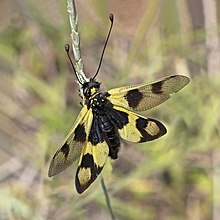Libelloides macaronius
| Libelloides macaronius | |
|---|---|

| |
| Male | |

| |
| Female | |
| Scientific classification | |
| Domain: | Eukaryota |
| Kingdom: | Animalia |
| Phylum: | Arthropoda |
| Class: | Insecta |
| Order: | Neuroptera |
| Family: | Ascalaphidae |
| Genus: | Libelloides |
| Species: | L. macaronius |
| Binomial name | |
| Libelloides macaronius (Scopoli, 1763) | |
| Synonyms | |
| |
Libelloides macaronius is a day-flying owlfly species of Europe and Asia. The genus belongs to the family Ascalaphidae, subfamily Ascalaphinae.
Description
The adult is a large insect somewhat resembling a dragonfly. Its body, eyes, and long clubbed antennae are black; the wings are bright yellow, spotted with black, the forewings being partly transparent near the wingtips. The abdomen ends with a pair of hooked claspers in the male, a short ovipositor in the female. At rest, adults often perch like dragonflies with their wings outspread. They fly rapidly and rather straight over grass or bushes.
The species has the excellent eyesight of predatory day-flying insects, though the large eyes are of the superposition type normally found in nocturnal insects.[1]
Distribution and ecology
The species occurs in central, eastern, and southern Europe, and Palearctic Asia. They live in relatively open areas such as farm meadows and pasture, and wilder dry grassland and scrubland. Adults are fast-flying diurnal predators that use their legs to catch their prey in flight. They have robust mandibles, able to pierce the exoskeletons of heavily-sclerotised prey. They feed on a wide variety of other insects including aphids, beetles, hemipteran bugs, cockroaches, dipteran flies, and neuropterans. They are predated upon by insect-eating birds and spiders.[2]
Taxonomy
The species was named Libelloides macaronius by the Austrian naturalist Giovanni Antonio Scopoli in 1763. Among the many synonyms are Ascalaphus macaronius (Scopoli, 1763), Myrmeleon kolywanensis (Laxmann, 1770), and Ascalaphus oculatus (Brullé, 1832).[3]
The species was depicted on postage stamps of Moldova and Ukraine.
- female with wings folded
- Eggs laid in rows on plant stalks
- Head, showing large two-part compound eye
- Adult on a 1997 Moldova postage stamp
- Adult on a 2005 Ukraine postage stamp
References
- ^ Belušič, Gregor; Pirih, Primož; Stavenga, Doekele G. (1 January 2013). "Acute and highly contrast-sensitive superposition eye - the diurnal owlfly Libelloides macaronius". Journal of Experimental Biology. 216 (Pt 11): 2081–2088. doi:10.1242/jeb.084194. ISSN 1477-9145. PMID 23431000. S2CID 5854004.
- ^ Devetak, Dušan (January 2002). "Owl-fly Libelloides macaronius (Scopoli, 1763) in Slovenia and in the northwestern part of Croatia (Neuroptera: Ascalaphidae)". Annals for Istrian and Mediterranean Studies. 12 (2): 219–226. ISSN 1408-533X.
- ^ "Libelloides macaronius Scopoli, 1763". Insecta.pro. Retrieved 2 December 2021.





